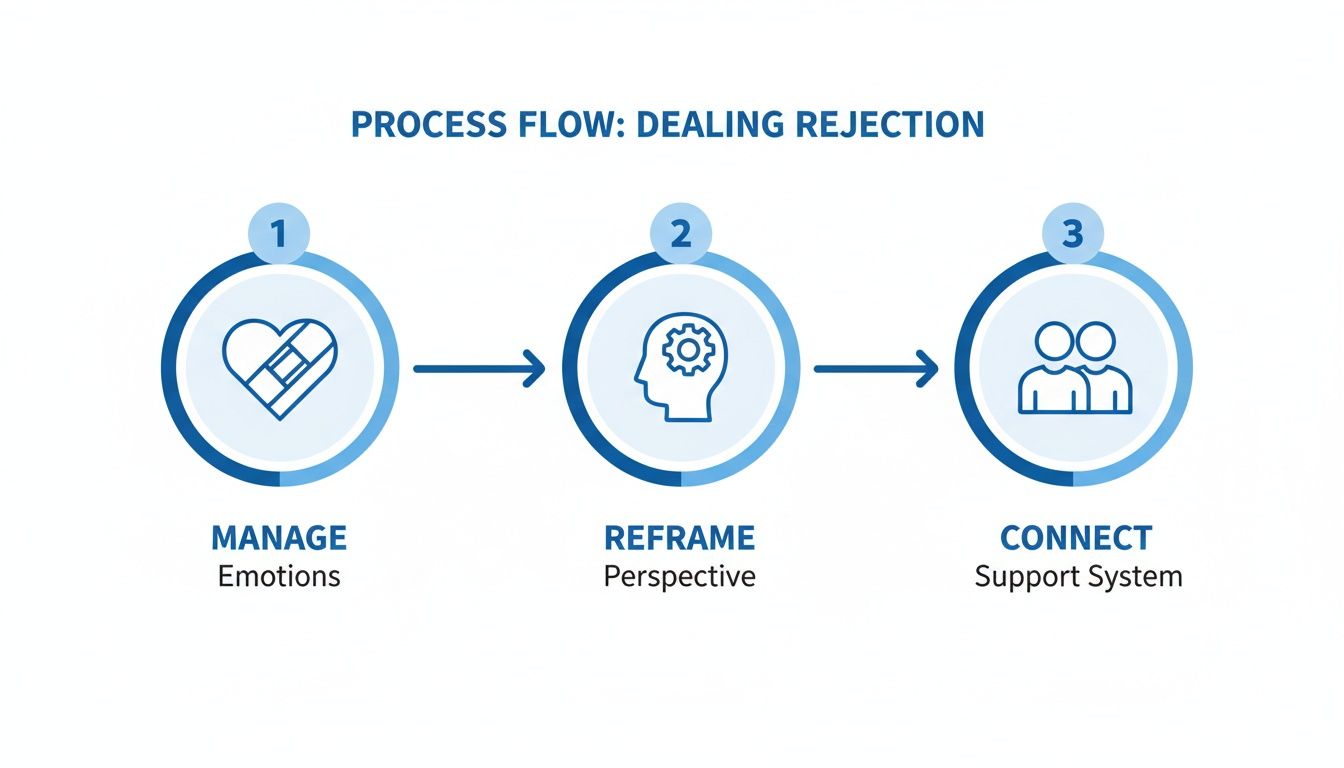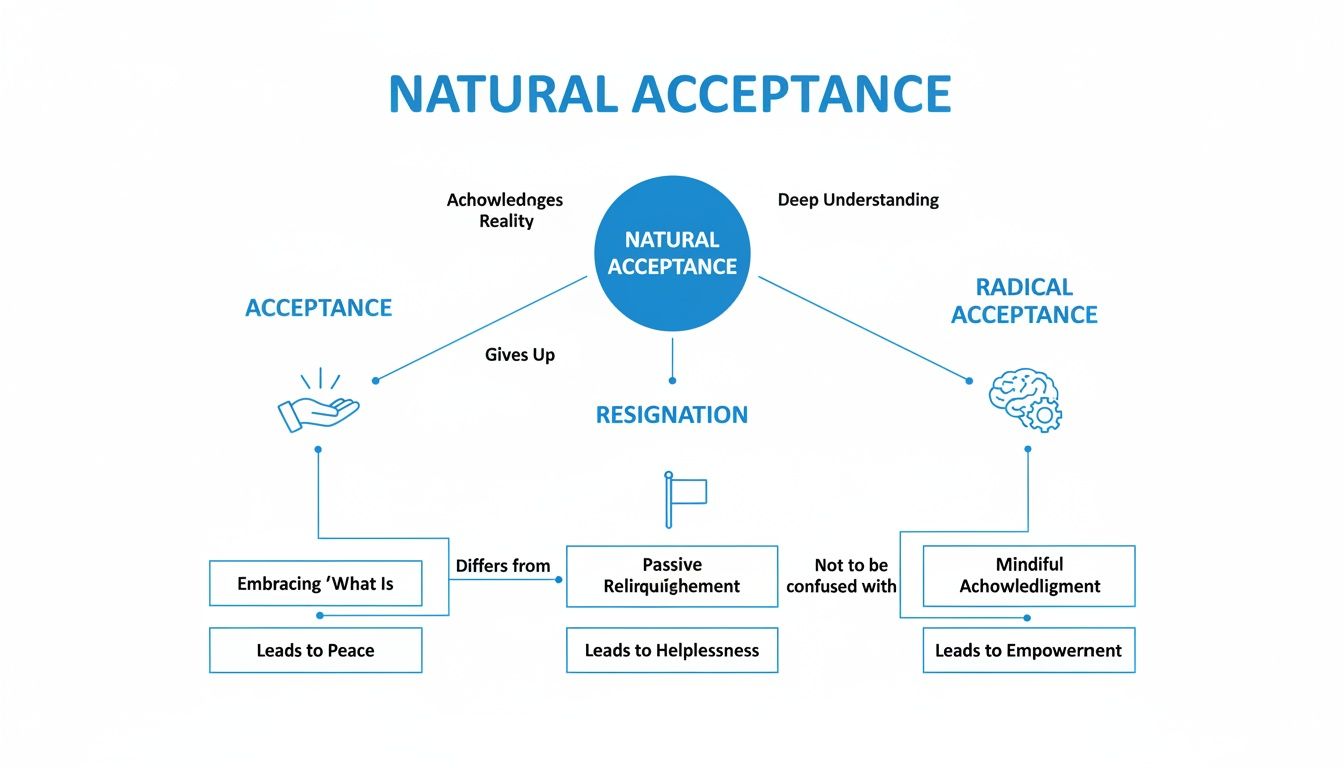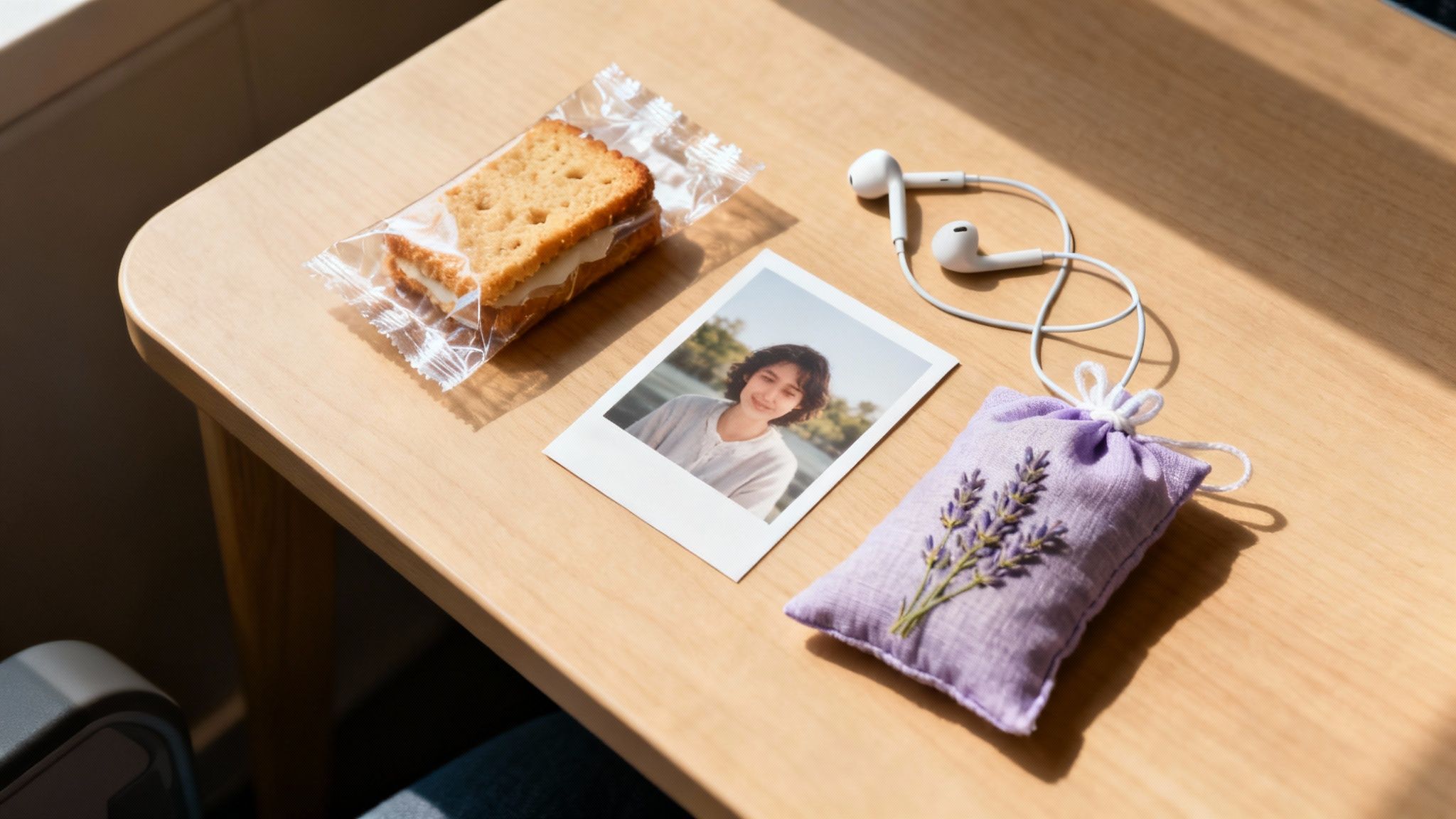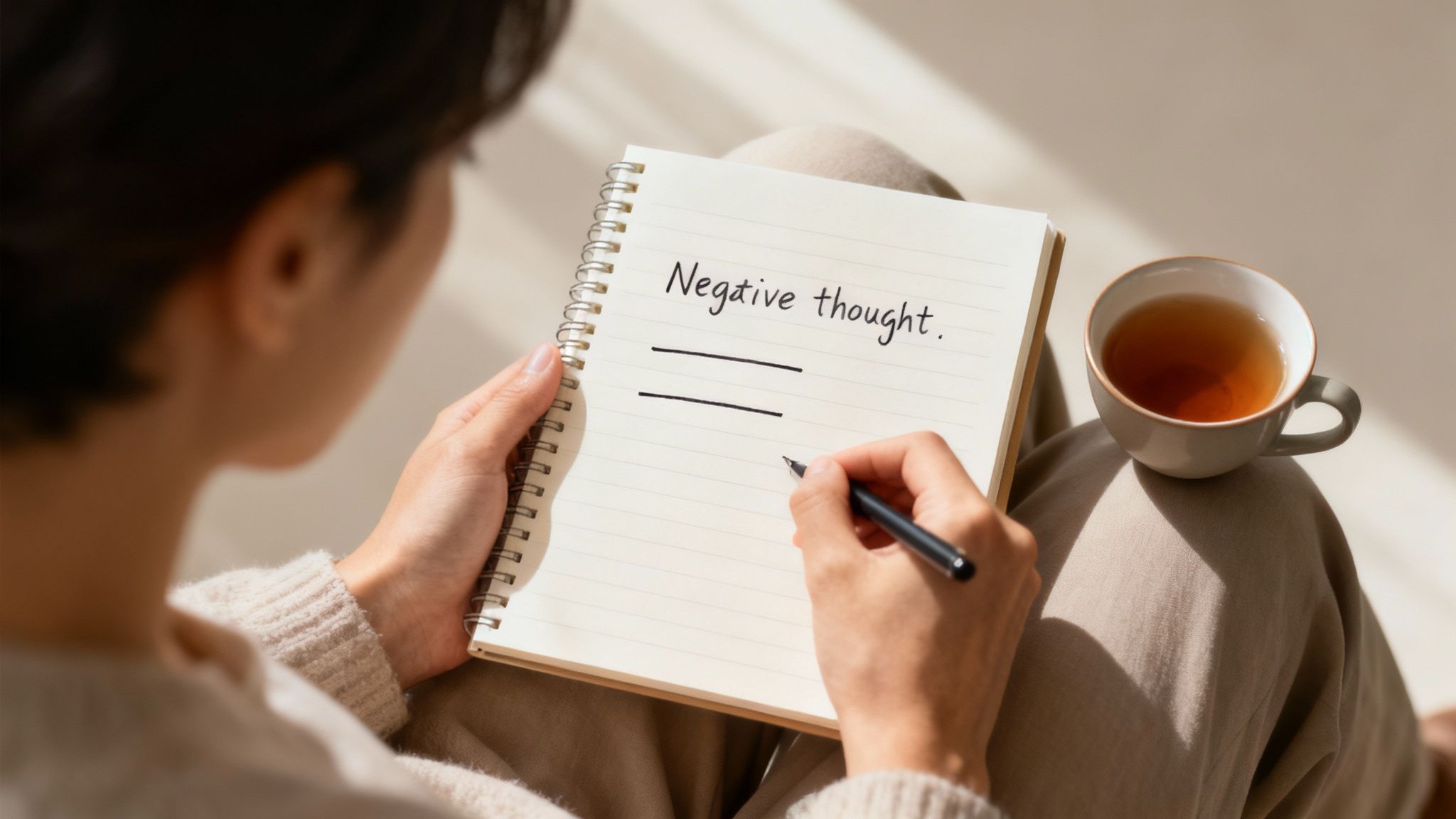The moments right after a rejection are crucial. It’s less about taking immediate action and more about allowing yourself to feel the initial sting without judgment. A few simple techniques can help bring your body back from that first fight-or-flight feeling.
Navigating the Initial Sting of Rejection

Let's be honest: rejection hurts. Whether it's a brief email for a job you wanted or a difficult conversation with someone you care about, the emotional pain is very real. Neuroscience shows our brains process social rejection in the same areas that light up for physical pain.
Your first instinct might be to push the feeling away or immediately create a story about what this rejection says about you. Thoughts like, “I knew I wasn’t good enough,” can be common. Instead of getting lost in this narrative, the kindest thing you can do is simply pause.
For a minute or two, just acknowledge the hurt without attaching a story to it. This small act of self-compassion creates the mental space needed to prevent a spiral of negative thoughts and supports your overall well-being.
Create a Moment of Pause
When disappointment hits, your body's stress response can kick in, leading to a racing heart and scattered thoughts. The goal isn't to pretend you don't feel it, but to manage it so it doesn't take control.
Creating a deliberate pause can make a significant difference; think of it as emotional first aid. These grounding techniques are simple and can be done anywhere.
- The 5-4-3-2-1 Method: Look around and mentally name five things you can see, four things you can touch, and three things you can hear. Then, notice two things you can smell and one thing you can taste to pull your focus into the present moment.
- Tactile Grounding: Find an object like your phone, keys, or a warm cup of chai and focus on its texture, weight, and temperature. This sensory input can act as an anchor during feelings of stress or anxiety.
- Box Breathing: To calm your nervous system, breathe in for four counts, hold for four, exhale for four, and hold again for four. Repeating this signals to your body that you are safe, helping to ease feelings of panic.
Having a few go-to coping actions can stop you from spiralling after a rejection. The table below offers a quick reference guide to help you through those first tough moments.
Immediate Actions to Manage the Sting of Rejection
| Healthy Coping Action | Why It Helps | Simple Example |
|---|---|---|
| Mindful Breathing | Activates the parasympathetic nervous system, lowering your heart rate and promoting calmness. | Inhale for 4 seconds, hold for 4, and exhale slowly for 6 seconds. Repeat 5 times. |
| Grounding (5-4-3-2-1) | Pulls your focus away from racing thoughts and anchors you in the present moment. | Name 5 blue objects you can see, touch 4 different textures, listen for 3 distinct sounds. |
| Self-Compassionate Phrase | Interrupts the inner critic and replaces self-blame with kindness. | Silently tell yourself, "This hurts, and that's okay. It doesn't mean I'm a failure." |
| Physical Movement | Helps to release pent-up nervous energy and stress hormones like cortisol. | Go for a brisk 10-minute walk, do a few stretches, or even just shake out your hands. |
These simple actions won't erase the feeling, but they provide a stable foundation to move forward from. They help you shift from a place of pure reaction to one of thoughtful response, building resilience.
"Your first reaction to rejection sets the stage for how you'll recover. Granting yourself a moment to breathe and feel without judgment is not a sign of weakness; it is the first step in building resilience."
By consciously taking control of these first few minutes, you reclaim your power. You acknowledge the pain without letting it define your next move, which is crucial for your long-term mental well-being.
What Rejection Does to Your Mind and Body

The ache you feel from rejection isn't just "in your head." Scientific studies show that the same brain regions are activated during social rejection as when we feel physical pain. This means your brain processes that emotional hurt as a genuine, measurable experience.
Understanding this is often the first step toward self-compassion. Your reaction isn't an overreaction; it’s a deeply human response, connected to our basic need for belonging. This mind-body connection explains why a setback can be physically draining.
The emotional turmoil often appears in physical ways, creating a loop of distress. This can lead to challenges like anxiety, burnout, or feelings of depression if not addressed with care.
The Emotional and Physical Toll
The initial sting of rejection can set off a chain reaction of emotional and physical responses. Emotionally, it can stir feelings of shame, sadness, or anger, leading you to question your worth. In a collectivist culture like India, where community expectations are high, this can feel especially heavy.
At the same time, your body may enter a state of stress. This can trigger symptoms that interfere with daily life, creating a cycle where emotional pain feeds physical discomfort.
You might notice some of these common physical reactions:
- Fatigue and Low Energy: The mental effort of processing intense emotions is exhausting, leaving you feeling wiped out.
- Sleep Disturbances: You might find your mind racing at night, making it hard to fall asleep or stay asleep.
- Changes in Appetite: Some people lose their appetite completely, while others may overeat to soothe emotional discomfort.
- Headaches and Muscle Tension: Stress often settles in the body, especially in the neck and shoulders, sometimes leading to headaches.
Recognizing these symptoms as a normal response to a painful event is key. It is not a sign of weakness but a sign that you are human and you cared about the outcome.
Remember, the goal isn't to stop feeling these things, but to understand them. By acknowledging the link between your mind and body, you can start to address both with kindness and care.
Understanding Rejection Sensitivity
Some people seem to move on from rejection easily, while for others, the hurt lingers. This difference can be related to "rejection sensitivity," a tendency to anxiously expect and overreact to being turned down. This is often a learned pattern, not a character flaw.
Past experiences can make your brain more alert to potential rejection. This heightened sensitivity can turn a minor slight into a major emotional event, triggering intense anxiety or feelings of depression. Understanding your own sensitivity level is empowering, as it allows you to observe your reactions with curiosity rather than criticism.
Building Resilience Begins with Awareness
Acknowledging what's happening in your mind and body is the foundation for moving forward. It validates your experience and helps shift your focus from self-blame to self-awareness, a crucial step for your well-being.
If you find that rejection consistently brings up overwhelming feelings of anxiety, persistent sadness, or intense workplace stress, professional therapy or counselling can help. These services offer a safe space to understand and work through these reactions.
Please remember that assessments available on platforms like DeTalks are informational and not diagnostic. They can, however, provide valuable insights into your emotional patterns and guide you toward the right kind of support.
Reframing Rejection as a Stepping Stone for Growth

After the initial emotional storm, the work of building genuine resilience begins. This next stage is about changing your perspective, a process known as cognitive reframing. It involves learning to challenge harsh, automatic thoughts that suggest a rejection is a final verdict on your worth.
The goal is to gently guide your inner narrative in a new direction. Instead of, "I was rejected because I'm not good enough," you can learn to frame it as, "This particular opportunity wasn't the right fit for me right now." This small shift separates the event from your identity and supports your well-being.
Detaching Your Identity from the Outcome
A major hurdle after rejection is our tendency to internalize it. We take a "no" and see it as proof of a fundamental flaw. But a rejection is just an outcome—a single data point, not a judgment on who you are.
Think of it this way: a chef whose new dish doesn't work out isn't a "bad chef." They simply learned one more way not to make that dish. Your setback is the same; it is information that can lead to growth.
Creating a 'Rejection Evidence Log'
Here is a practical exercise to help you separate facts from feelings. Start a "rejection evidence log" to look at what happened with a clear, objective lens. For each rejection, jot down the answers to these questions:
- The Feeling: What was my immediate emotional reaction? (e.g., "I felt worthless and embarrassed.")
- The Story: What story did my mind create about why it happened? (e.g., "I'm not smart enough for that role.")
- The Facts: What are the objective facts I know for sure? (e.g., "There were 200 other applicants. The company needed someone with more experience in a specific software.")
- The Growth: What can I learn from this? (e.g., "I can build my skills in that software. My interview skills felt strong, which is a win.")
This simple practice trains your brain to look for opportunities to grow instead of defaulting to self-criticism. It’s a powerful tool for managing workplace stress and building a much healthier mindset. For more on professional setbacks, this guide on how to handle job rejection and move forward offers specific strategies.
Redefining Success in a Cultural Context
In India, societal and family expectations often add another layer of pressure, making rejection feel like a public failure. This can lead to feelings of shame, isolation, and anxiety.
Redefining what success means to you is a crucial act of self-care. This involves shifting your focus from a rigid outcome to a flexible journey of personal growth. It could mean celebrating small wins or valuing the learning process itself.
"True resilience is not about avoiding rejection. It's about realising that your worth is constant and unwavering, regardless of external validation or setbacks. Each 'no' is a redirection, not a dead end."
Turning Pain into Purposeful Growth
Cognitive reframing isn’t about pretending the hurt isn't real. It's about acknowledging the pain while actively looking for the lesson within it. By deliberately changing your perspective, you turn a painful experience into fuel for the journey ahead.
This proactive approach is fundamental to long-term emotional well-being. Research consistently shows that people who reframe negative experiences have lower rates of depression and report greater life satisfaction. When you start seeing setbacks as chances to learn, you build an inner strength that contributes to lasting happiness.
Professional support can make a significant difference. Guided therapy or counselling can help you develop these skills, process your feelings, and build self-efficacy in a supportive environment.
Actionable Steps to Rebuild Your Confidence
Once you have processed the initial sting and started to adjust your perspective, it’s time to move forward. Rebuilding confidence is about taking small, deliberate steps that reconnect you with your own strength and worth.
This part of the process is about creating positive momentum, no matter how small. Each action helps push back against the feelings of inadequacy that rejection can leave behind.
Cultivate Self-Compassion
Self-compassion is a powerful tool for building lasting resilience. It means treating yourself with the same kindness you would offer a good friend during a tough time. For many of us, this can feel unnatural, but it is vital for your well-being.
Instead of letting a harsh inner critic take over, try a gentler approach. Acknowledge that what happened was painful and that it's okay to feel disappointed. This simple shift can reduce feelings of shame and isolation.
Here are a few ways to put this into practice:
- Mindful Self-Kindness: When you notice negative self-talk, pause. Ask yourself, "What would I say to a friend right now?" Then, offer that same supportive language to yourself.
- Acknowledge Common Humanity: Gently remind yourself that everyone faces rejection; it's a universal human experience. Realizing you aren't alone can normalize the pain.
- Write a Compassionate Letter: Try writing a letter to yourself from the perspective of someone who cares deeply about you. Acknowledge the hurt, but also highlight your strengths and past successes.
Create a Success Inventory
Rejection can make you forget all the times you have succeeded. Your brain may focus on the one "no," overshadowing a long history of "yeses." A 'success inventory' is a useful tool to counter this negativity bias.
Sit down and write down your accomplishments, both big and small. This list is a tangible reminder of what you're capable of, from landing a project at work to being a good friend to someone in need.
Rejection can temporarily cloud your judgement, but it cannot erase your history of achievements. Your success inventory is your personal, undeniable proof of competence and worth.
This list becomes a powerful resource. Whenever self-doubt creeps in, you can look at it to ground yourself in the reality of your capabilities and challenge irrational feelings of failure.
Set Small, Achievable Goals
After a setback, tackling a massive goal can feel overwhelming. The key to regaining momentum is to think small. Setting and achieving tiny, manageable goals rebuilds your sense of agency one win at a time.
These goals don't have to be related to the area where you were rejected. The point is to create a positive feedback loop of action and accomplishment.
For example, you could:
- Reconnect with a Hobby: Spend 30 minutes doing something you enjoy, whether it's painting, walking, or listening to music.
- Organise a Small Space: Tidy a single drawer or clear off your desk. Bringing order to your physical environment can have a calming effect on your mind.
- Reach Out to a Friend: Send a quick text to someone supportive. Positive social connection is a great antidote to the isolation that can come with rejection.
Every task you complete sends a message to your brain: "I am capable." This slowly chips away at feelings of helplessness that can follow a setback, helping to ease workplace stress and anxiety.
Re-engage with Your Strengths
Rejection often focuses our attention on perceived weaknesses. A powerful countermove is to intentionally do things that play to your natural strengths. This reminds you of what you're good at and what makes you feel competent.
If you are a great organizer, plan a small get-together. If you are a creative problem-solver, tackle a puzzle. The idea is to get back into a state of 'flow,' where you feel effective and engaged.
Professional setbacks can be tough on your confidence. For example, when you are dealing with recruiter ghosting, knowing how to respond proactively is crucial for regaining a sense of control. Taking small, informed steps can help rebuild your professional self-worth.
Rebuilding confidence is an active process. If feelings of depression or intense anxiety persist, remember that seeking professional counselling or therapy is a sign of strength.
Finding Strength in Social and Professional Support

Going through a rejection can feel incredibly isolating, but you don’t have to face it alone. Rebuilding your resilience gets a massive boost from the people around you. Reaching out is an act of strength.
Leaning on your support system—friends, family, or a trusted mentor—is one of the most effective ways to process what happened. Sharing your experience can lift a huge weight and remind you that your worth is not tied to a single outcome.
Starting the Conversation
Bringing up a painful experience can feel awkward, but a simple, honest opening can make all the difference. Sometimes, all you need is a listening ear and empathy, not advice.
If you’re not sure what to say, here are a few ideas:
- For a close friend: "Hey, I'm having a rough time after that job rejection. Would you be free to chat? I don't really need solutions, just someone to listen for a bit."
- For a family member: "I've been feeling pretty down since [the event]. Could we talk for a few minutes? Just hearing your voice would help a lot."
- For a mentor: "I recently had a professional setback that's really knocked my confidence. I'd love to get your perspective on how you've handled similar challenges."
These kinds of starters set a clear boundary—you’re looking for support, not a quick fix. This can create a safe space for you to share openly.
When to Seek Professional Support
Friends and family are incredible, but sometimes the feelings stirred up by rejection run deep. If a setback triggers persistent anxiety, a sadness you can’t shake, or a sense of hopelessness, it might be time to consider professional help. This is a proactive step toward protecting your long-term well-being.
Therapy and counselling offer a unique, confidential space with a trained professional. A therapist can help you untangle complex emotions and identify unhelpful thinking patterns.
Seeking professional help isn't about being "broken"; it's about being resourceful. It's an investment in your mental health, just like going to the gym is an investment in your physical health.
If you find yourself struggling with workplace stress after a professional setback, a counsellor can provide specific strategies to cope. They can help you build the mental toolkit needed to navigate future challenges with more confidence.
Finding the Right Professional Fit
The idea of finding a therapist can feel daunting, but platforms like DeTalks are designed to make it simpler. You can connect with qualified professionals who specialize in areas like resilience, anxiety, depression, and managing professional stress.
Many platforms also offer informational assessments. It’s important to remember these are for insight, not a diagnosis. They can, however, provide a better understanding of your emotional patterns and serve as a good starting point for a conversation with a mental health professional.
The positive impact of this kind of support is real and documented in India. You can discover more about the positive impact of mental health initiatives from the Press Information Bureau of India. Ultimately, connection is a potent antidote to the shame and isolation that rejection can create.
A Few Final Thoughts on Your Journey Forward
Learning to overcome rejection isn't about building an emotional wall so you never feel pain again. It's about learning how to heal, reflect, and grow from the experience.
This is a continuous practice of cultivating your inner strength and making your mental well-being a priority. The path forward is paved with the strategies we've discussed.
It starts with allowing yourself to feel without judgment. Then, it's about understanding the mind-body connection and gently reframing your thoughts to find the lesson hidden in the setback.
This Is a Journey of Self-Compassion
Think of every setback as an opportunity to learn something new about yourself. Each time you face a disappointment, you get a chance to practise self-compassion, which is key for managing challenges like workplace stress or anxiety.
This is about progress, not perfection. You will have good days and bad days, and that is completely okay.
The goal isn't to become immune to rejection. It's about building the quiet confidence that you can handle it when it comes. That trust in yourself is a true testament to your strength and a key ingredient for a fulfilling life.
Remember, seeking support through therapy or counselling is a sign of strength. If the weight of it all feels too heavy, a professional can offer you the right tools to lighten the load and help you move from surviving to thriving.
Your Questions About Rejection, Answered
It's natural for questions to come up when you're dealing with the sting of rejection. Here are answers to some of the most common ones.
How Long Does It Take to Get Over Rejection?
There is no universal timeline for healing. How long it takes depends on what the situation meant to you and your personal way of processing things. It could be days for a minor setback or longer for a deep, personal blow.
Instead of focusing on a timeline, try to focus on small, steady progress. This could mean being a bit kinder to yourself today than yesterday. If you feel stuck or overwhelmed by anxiety for more than a few weeks, professional support can help you work through the pain.
Is It Normal to Feel Physically Ill After Rejection?
Yes, it is completely normal. Your brain processes the emotional pain of rejection in the same areas that register physical pain. This mind-body link can trigger real physical symptoms like headaches, fatigue, or an upset stomach.
These are signals that your body is reacting to emotional stress. Gentle movement, like a short walk, or simple grounding exercises can help. If physical symptoms are severe or persist, it is always best to check in with a doctor.
What if Rejection Makes My Anxiety or Depression Worse?
If you already live with anxiety or depression, rejection can amplify those feelings. It is important to be extra gentle with yourself and use the coping strategies that have helped you in the past.
This is also a critical time to consider reaching out to a mental health professional. Therapy offers a space to get expert guidance on managing these intensified emotions and preventing a potential spiral. Seeking that help is a sign of strength.
At DeTalks, we know that self-awareness is the foundation for a more resilient and meaningful life. If the pain of rejection is weighing you down, our network of skilled therapists and insightful, science-backed assessments are here to offer the clarity and support you deserve. Take the next step and find a professional who gets it today.





















